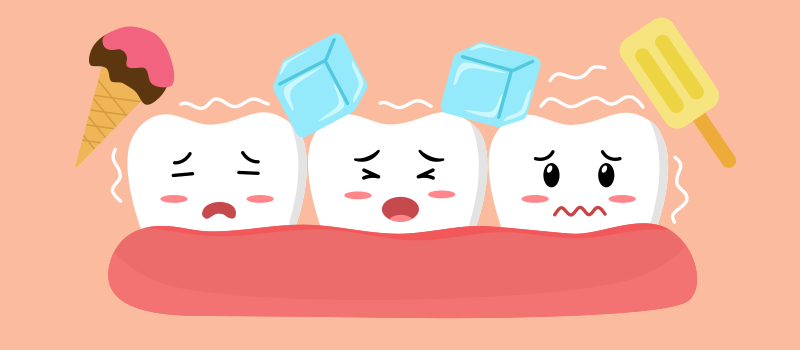
23 Jul Sensitive Teeth: How to Combat Aching Teeth in the Cold
A post by Healthline, citing the Academy of General Dentistry, reveals that 40 million Americans experience tooth sensitivity.
That sharp, sudden pain can strike when you drink cold water, eat something sweet, or step into chilly air. It can turn simple moments into painful ones. If you’ve felt it, you know how it affects your comfort and confidence.
Knowing how to avoid tooth sensitivity can help you enjoy life again without the sting. In this article, you’ll learn what causes sensitivity, how to protect your teeth in the cold, and what steps to take for lasting relief.
What Causes Tooth Sensitivity in the Cold?
Tooth sensitivity because of the cold often starts with enamel damage or gum recession. When enamel wears away or the gums recede, the dentin underneath becomes exposed. Dentin contains tiny tubules that connect to the tooth’s nerves.
Cold air or liquids pass through these tubules, causing sudden, sharp pain that can catch you off guard. Common causes include:
- Brushing too hard
- Tooth grinding
- Gum disease
- Acidic foods and drinks
- Aging
- Tooth decay
- Cracked or chipped teeth
Even daily habits, like sipping soda or brushing aggressively, can slowly wear down your teeth’s defenses. Over time, that damage builds up. By finding out what causes the sensitivity, you can protect your teeth. This will help reduce dental pain during the cold months.
How to Protect Your Teeth in the Cold
Tooth sensitivity, especially during cold seasons, can make eating, drinking, or even talking outside uncomfortable. Cold air reaches exposed dentin and triggers pain, often with just a deep breath. You may need to learn how to protect your teeth during these periods to stay comfortable and maintain your daily routine.
Use a Sensitivity Toothpaste
One of the easiest ways to prevent discomfort is to switch to a toothpaste specifically made for sensitive teeth. These formulas include compounds, such as stannous fluoride or potassium nitrate.
They help block the pain signals traveling from the tooth surface to the nerve. Regular teeth cleaning, using the right toothpaste, can help strengthen enamel and reduce sensitivity to cold foods or air.
Breathe Through Your Nose
Cold air during winter can trigger sharp pain when it hits sensitive teeth, especially if you breathe through your mouth. Inhaling icy air directly over your teeth can expose the nerves and worsen discomfort.
Breathing through your nose is a simple way to reduce this exposure and stay more comfortable outdoors. You can also wear a scarf or mask to help warm the air before it reaches your mouth.
Avoid Acidic Foods and Drinks
Eating acidic foods can erode your enamel. These foods include:
- Citrus fruits like oranges and lemons
- Tomatoes and tomato-based sauces
- Pickles and vinegar-based items
- Soda and carbonated drinks
- Wine and fruit juices
- Sour candies
Over time, acid gradually erodes the protective enamel on your teeth, revealing the dentin beneath. When exposure occurs to dentin, cold air or drinks can trigger sharp pain. To protect your enamel and reduce sensitivity, eat less of these foods. Rinse your mouth with water afterward.
Use a Soft-Bristled Toothbrush
Brushing too hard or using a hard-bristled toothbrush can damage your teeth over time. It wears down enamel, exposes the dentin, and may even cause your gums to recede. Tooth sensitivity often follows, especially in cold weather.
To protect your smile and maintain oral health, switch to a soft-bristled toothbrush. A softer brush is gentle on both enamel and gums while still effectively removing plaque. Using the right toothbrush each day helps prevent pain, protect your enamel, and support long-term strength and comfort.
Wear a Mouthguard Outdoors
If you grind your teeth or clench your jaw during cold weather, a custom mouthguard can help. It provides insulation from cold air and protects your enamel from wear.
Wearing one outdoors adds another layer of defense. Ask your dentist about a well-fitting mouthguard that offers daily comfort and protection, particularly in cold weather
Tooth Sensitivity Treatments
Despite making changes at home, you might still feel a sharp sting when enjoying a cold drink or stepping outside on a cold day. When discomfort lingers, it may be time to seek professional care from experts like McIlwain Dental Specialists.
Our dental team can help you understand the root cause of tooth sensitivity and guide you through the best available treatment options. With our help, you can select a solution that meets your needs and provides lasting relief.
Fluoride Treatments
Fluoride plays a key role in strengthening teeth and easing sensitivity. It works by rebuilding weakened enamel and protecting the tooth’s outer surface. Dentists often apply fluoride gel or varnish directly to the areas causing pain.
These treatments are quick, painless, and highly effective. In some cases, you may also receive a prescription fluoride rinse for home use. With regular application, fluoride can help reduce dental discomfort and shield your teeth from pain caused by cold air or drinks.
Dental Bonding
When tooth roots become exposed due to gum recession or enamel loss, bonding can offer quick relief. Dentists apply a tooth-colored resin to cover the exposed dentin or root surface, forming a protective layer.
The barrier blocks cold sensations and helps prevent nerve irritation. Dental bonding is a fast, non-invasive procedure that blends naturally with your teeth. It is a strong option for treating moderate sensitivity while providing lasting comfort.
Root Canal Therapy
When sensitivity becomes severe and persists despite other treatments, root canal therapy may offer the best solution. Dentists remove the damaged or infected nerve from inside the tooth, stopping pain directly at the source. Modern root canal therapy is safe, effective, and relatively comfortable.
How to Avoid Tooth Sensitivity: Seek Professional Dental Help
Knowing how to avoid tooth sensitivity means doing more than using the right toothpaste. You need to protect your enamel, develop healthy habits, and stay ahead of problems. When the pain continues, it’s time to see a dentist.
At McIlwain Dental Specialists, we’ve helped families in Tampa Bay and Wesley Chapel for over 40 years. We treat kids, teens, and adults with care and experience.
Our team offers gentle solutions for sensitive teeth and flexible payment options to fit your needs. Get in touch with us today to book your visit.


